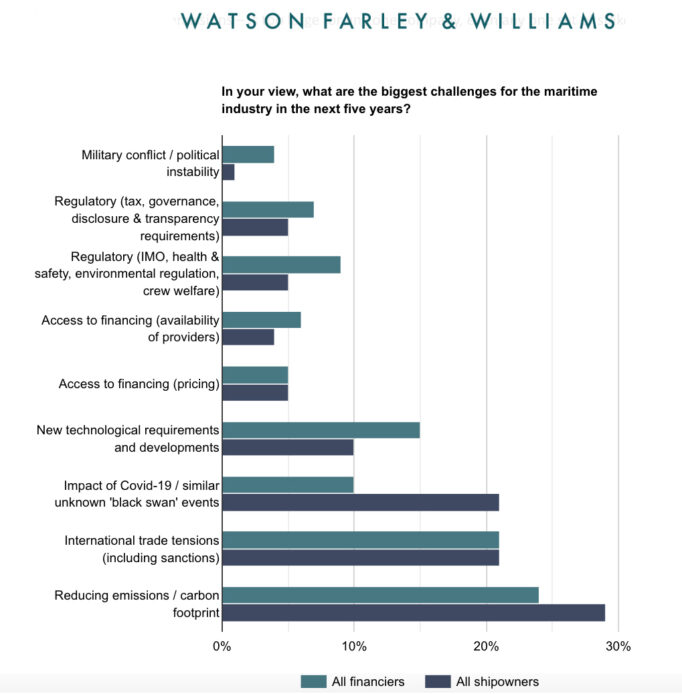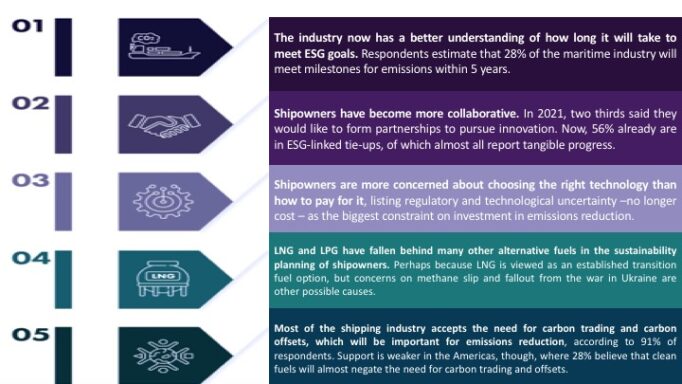Following the successful launch in February 2021 of our award-winning in-depth report The Sustainability Imperative, now more than ever we are seeing how the maritime sector is exposed to the impact of global mega-trends such as climate change and the rise in international trade tensions.
Exploring how those within the industry – owners, charterers, financiers and investors – grapple with the current and anticipated environmental, social and corporate governance challenges, and what they mean for the industry, forms the basis of our follow-up report.
The opinions of circa 500 industry participants have once again been surveyed and we are excited to share these insights with you in our highly anticipated report The Sustainability Imperative – Part 2.
The Sustainability Imperative – Part 1. Sustainability concerns have rocketed up the shipping agenda over the past decade, with environmental, social and corporate governance (ESG) issues already influencing financing decisions, fleet renewal and regulatory change across the industry.
Decarbonization of shipping is by far the most complex and pressing area. Most of the focus to date has been on the ‘E’ in ESG, but the ‘S’ (Social) and ‘G’ (Governance) elements also present growing challenges to the industry in areas such as transparency, diversity and crew welfare.
Some of these problems are down to simple organizational choices, but the environmental challenge – principally the reduction of CO2 emissions – is too large for any one company, even any one set of stakeholders, to address.

Chart by Visualizer
There are significant technological, financial and regulatory hurdles to clear before shipping has a viable path towards the International Maritime Organization’s goal of 50% lower greenhouse gas emissions by 2050, including the recurring question of who shoulders the risk and cost of developing new technologies.
Moreover, shipping faces structural upheaval. Longstanding pressures on smaller shipowners to consolidate may become difficult to ignore in the pursuit of a sustainable industry, while the privacy traditionally embraced by sections of the industry may come under pressure from demands for greater transparency from investors, lenders, regulators and customers.
KEY CONTACTS

George Paleokrassas Sr Partner New York
“We decided to focus our global maritime report on the single most important issue affecting the industry – sustainability.”
~ George Paleokrassas
Drawing on a series of in-depth interviews and a global survey of 545 senior industry leaders, this report examines the shipping world’s views on sustainability and governance and what actions it is taking as result. It also asks how these issues might affect the way the shipping sector finances itself and even the very structure of the industry.

Lindsey Keeble Managing Partner London
“The survey points to a wider willingness to collaborate and form joint ventures to share the financial burden of decarbonizing shipping.”
~ Lindsey Keeble90% of financiers are either going beyond standard governance checks, or are planning to do so in the near future.

Simon Petch Partner London
“There is preference across the board for government support in funding research into alternative fuels and increased efficiencies. That said, public funding for shipping has always been a challenge given the global
nature of the industry.”~Simon Petch
The Report Highlights 6 Key Findings:
- Reducing carbon emissions is the main and most immediate challenge, though trade tensions, Covid-19 and access to finance are also important;
- Financiers attach more importance to sustainability issues than operators do;
- Despite commitment to sustainability, traditional ship finance banks have a limited appetite for funding new clean-technology upgrades themselves – or accommodate their financing by others;
- Decarbonization looks set to drive greater cooperation among industry participants;
- Industry looks to governments to lead the funding of clean technology and fuel research; and
- Shipowners are wary of committing to many new green technologies.
Our follow up report The Sustainability Imperative – Part 2, available to download here, shows growing collaboration between industry participants on sustainability. Just over two years later, the industry has a better idea of the trade-offs necessary to achieve net zero, although most of the practical work still lies ahead, and regulatory and technology uncertainties remain. This new research seeks to understand how attitudes have evolved, who is shaping today’s ESG agenda and how sustainability squares with new geopolitical challenges.
62% of shipowners are likely or very likely to form joint ventures to fund innovation in the next five years.
KEY TAKEAWAYS
Drawing on a series of in-depth interviews with shipowners, charterers and financiers and a global survey of nearly 500 executives and senior managers across those communities, our key findings of The Sustainability Imperative – Part 2 are:

Source: https://www.wfw.com/reports/the-sustainability-imperative/